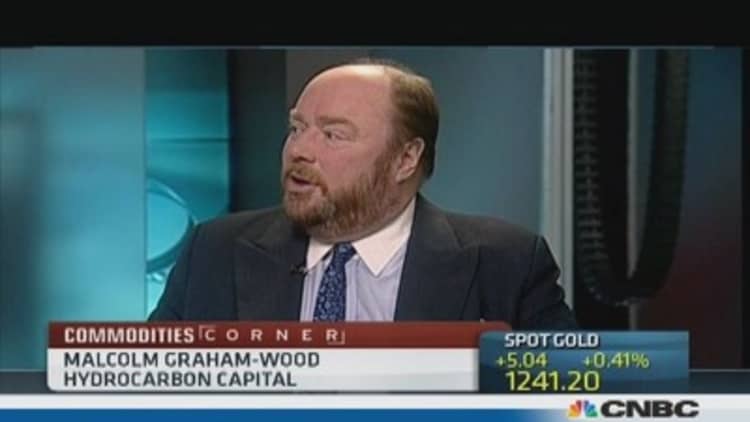
The latest round of weak services data from China have added to concerns that growth in the world's second-largest economy was stuttering.
But any slowdown won't have a long term effect on the price of oil, says Malcolm Graham-Wood, founding partner at Hydrocarbon Capital, who believes China's increasing appetite for cars will help the energy markets.
Headline growth across the globe is seen as one of the key drivers of oil prices with economic expansion seen as bullish for demand as more and more people take a visit to the pump. China is seen as key in this demand picture with a blossoming middle class expected to invest heavily in the automobile sector.
(Read More: China services sector at slowest pace in over 2 years)
"There's a one year waiting list for a decent car in China. It's like 15 years ago when we went from bicycles to motorbikes, and people don't understand that," Graham-Wood told CNBC Monday.
The world's second largest economy is so connected to the price of Brent Crude, according to Graham-Wood that he explained that if investors are gloomy about China then "you need to be gloomy about the oil price".
Brent crude rose above over $107 a barrel on Monday, bouncing back from its biggest weekly fall in six months. U.S. crude gained 42 cents to $94.39 a barrel by Monday morning. The contract posted its biggest weekly drop since June 2012.
Graham-Wood also indicated that U.S demand continued to beneficial for the oil price and maintained that global demand is "very, very robust". "People still drive, you can't change it," he said.
He also expects annual growth in China's gross domestic product (GDP) to hold firm at 7.5 percent – in spite of the HSBC/Markit services sector Purchasing Managers' Index (PMI) dropping to 50.9 in December from 52.5 in November, its lowest point since August 2011.
(Read More: New year, new woes for China stocks)
This lull in the services sector follows similar weak data from the manufacturing industry. Meanwhile, billionaire investor George Soros said in a Project Syndicate opinion price on Thursday that he believes the future direction of China is the "major" source of uncertainty facing the global economy at the moment.
Marshall Gittler, a market strategist at IronFX said that the Chinese data, along with recent weak manufacturing data, confirmed the slowdown in the country's economy.
"As the government there comes to grips with the twin problems of overcapacity in manufacturing and excessive local government debt, China is likely to be the next country to go through the deleveraging process, which will naturally result in slower growth," he said in a morning note.
—By CNBC.com's Matt Clinch; Follow him on Twitter @mattclinch81


